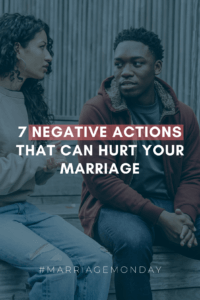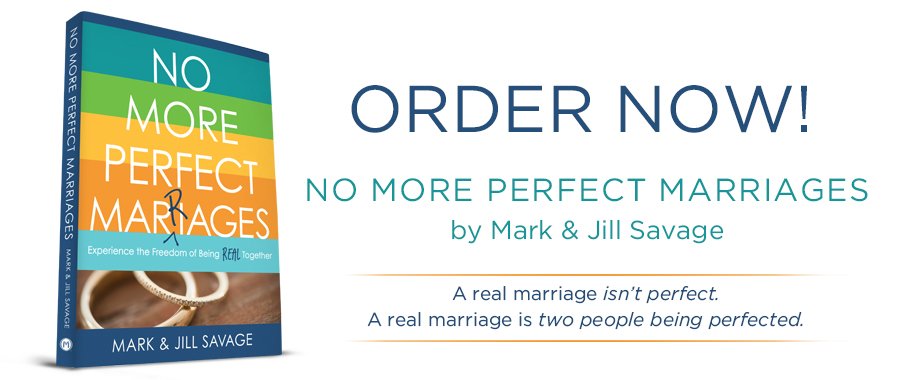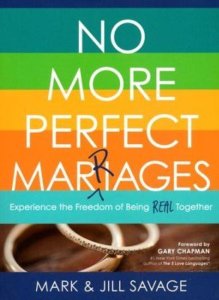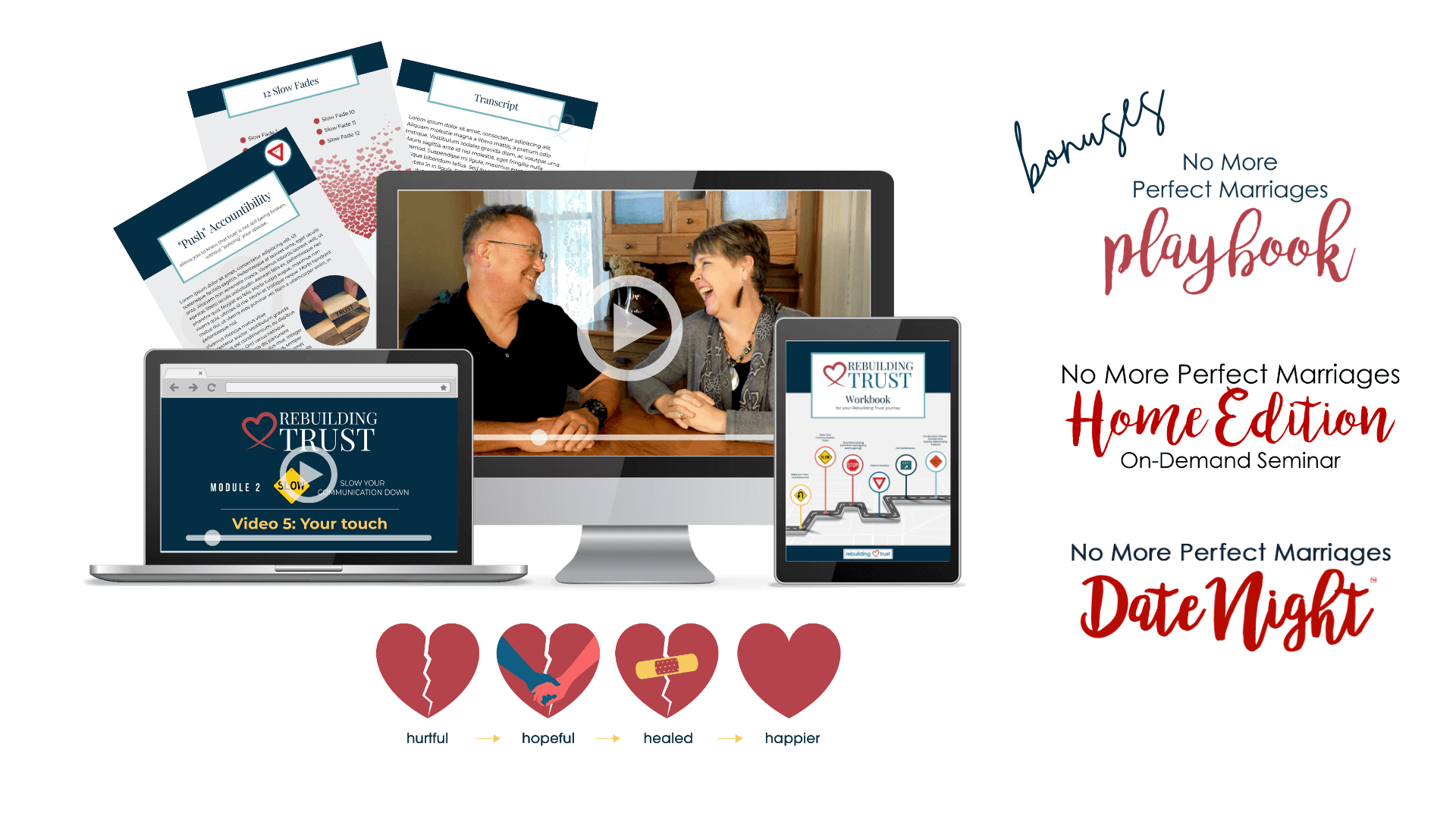 Mark: When Jill and I look back at what contributed to the dark season in our marriage, we found that it wasn’t the big things that made a difference. It was actually the little things that simmered under the surface. These things began an unraveling that gained momentum over time.
Mark: When Jill and I look back at what contributed to the dark season in our marriage, we found that it wasn’t the big things that made a difference. It was actually the little things that simmered under the surface. These things began an unraveling that gained momentum over time.
Jill: We like to say that no marriage crumbles in a day. It’s a drift of one centimeter to another, one feeling or one decision that leads to another feeling or decision that’s a little off-center. When we leave these things unaddressed, these feelings can draw us away from each other instead of toward each other.
Mark: We’ve found there are some negative actions that appear to be small, but they can lead you down a path that not only will hurt your marriage but can cause it to experience a crisis. When we are able to identify these negative actions, then we have the opportunity to do something about them before they hurt our marriages to the point it may feel as if it is beyond repair.
Jill: We know that these are common patterns of drifting that every married couple needs to understand, guard against, and correct when identified. If the damage of these actions continues unnoticed and unattended, one day you make up and think, How did we get so distanced from one another?
#1: Unrealistic Expectations
Jill: When we entered into our marriage, we quickly discovered that we both had some unrealistic expectations. Like many girls, I had consumed my fair share of romance novels, chick flicks, and magazine articles that filled my head with all kinds of unrealistic messages about marriage, romance, and being in love.
Mark: Unrealistic expectations can show up when we idealistically believe our spouse will see things the exact way we see things. Most of our expectations and comparisons show up because we’ve idolized other marriage relationships, we’ve allowed the media to feed us lies of impossible standards, or we’ve concocted our own unrealistic ideals.
Jill: These crazy, unrealistic expectations can rob us of our joy and cause distance in our relationship if we are not careful.
READ: 5 Ways Unrealistic (or Unmet) Expectations Are Harming Your Marriage | #MarriageMonday
#2: Minimizing
Mark: The word minimize means to “treat something as less important than it really is.” I did this for many years in our marriage. Something would happen and I’d just let it slide. The only problem is that it wasn’t sliding. It was pooling. It was accumulating in my head and my heart, fading from minimizing to harboring, and eventually to bitterness.
Jill: I had no idea of the cesspool of emotions Mark had churning inside of him. Occasionally, he would express frustration at something, and that’s where my own minimizing came into play. I would minimize his frustration. I didn’t dig deeper, I didn’t ask questions; I just gave him a logical response that made sense to me—the thinker—but didn’t tend to his—the feeler’s—emotions.
Mark: There is a healthy side to letting things go. However, what happens with minimizing is that something that needs to be addressed is instead buried. We tell ourselves things like, “It doesn’t matter.” “It will never change.” “It’s not worth the conflict.” When we do this, we miss the opportunity to figure something out together, strengthen our relationship, and deepen our intimacy.
#3: Not Accepting Our Differences
Jill: For most of us, our spouse’s differences are what drew us to one another in the first place. It’s not until we say “I do” and begin to live every day together that those same differences begin to grate on our nerves.
Mark: I was drawn to Jill’s strength when we first met. She knew what she wanted and she went after it. After we got married, however, I grew to dislike her strength. When she believed in something, she strongly believed in something. She was black-and-white and I had a little more gray in me. She was organized, knowledgeable, and a strong leader, but too often I felt like her strength came across as parenting me. Sometimes it was what she said and sometimes it was how she said something.
Jill: Our disagreements were often fueled by not accepting our differences and trying to force each other to change. When this didn’t work, it brought up feelings of rejection and thinking that we were just “too incompatible.”
Mark: Remember, different is not wrong. It’s just different.
#4: Unhealthy Responses to Disagreement
Jill: Disagreeing is actually an important part of marriage. You will disagree. You need to disagree. However, how we respond AFTER a disagreement has the potential to cause an unhealthy break in our relationships.
Mark: For example, I would typically respond one of two ways after a disagreement. I would either Disagree➔ Argue ➔ Control (Rage) or I would Become Passive ➔ Withdraw➔, Deceive (Do what I want behind the scenes). Neither of these was healthy, but they are the reality many of us start to ride out in marriage if we don’t do something to stop it.
Jill: My direction after differing opinions was different than Mark’s. Mine was Disagree ➔ Control ➔ Crush. Too often my pride would fuel me as I worked harder to win than to listen. I pushed and prodded to control and in doing so, would too often crush my husband’s spirit. When winning is more important than listening, or when a spouse feels their way is the right way and their spouse’s way is the wrong way, it is crushing to their partner who doesn’t feel heard or valued.
Mark: When disagreement happens, you and your spouse probably head into one of these wrong directions or one of your own. When we disagree, how we handle it can cause us to either be pulled apart further or it can cause us to become more connected.
#5: Defensive Responses
Mark: While we had drastically improved our communication and conflict resolution through years of marriage counseling, we still had unhealthy undercurrents beneath the surface of our relationship. When our conflicts went unresolved because either or both of us were responding defensively, I would isolate internally.
Jill: I would do the same thing. The slow fade of defensiveness moves from unresolved conflict to isolation. I would recover privately and internally rationalize why I was right. Too often I didn’t seek to understand.
Mark: When we defend, we don’t listen. We don’t own our own stuff. We don’t consider how we might not be right or fully right. Our logic can often undermine our love. When we are defensive, our reasoning trumps the relationship.
#6: Naiveté
Jill: Naiveté is to knowingly place ourselves in a position of relational danger downplaying the possibility that it could lead to compromise. Years ago, that primarily meant being careful about not being alone with someone of the opposite sex other than your spouse. Today, social media has opened up a whole new arena of relationship circles where seemingly innocent connections can lead to not-so-innocent relationships.
Mark: My naiveté fade started with “this won’t hurt anyone” (naïve) to “I deserve this. I need to let off some steam” (rationalize) to “another relationship just might be the answer” (compromise). This is a real-life picture of James 1:14–15. My misplaced desire led to sin, which led to death. Not a physical death, but an emotional, spiritual, and relational death.
Jill: Naiveté can also hurt your marriage when it links arms with unrealistic expectations. This leads us to believe fantasies about things that already exist in our lives but are not to the level we are expecting in our minds. When we let these thoughts fester, they can lead us to do things that will ultimately harm our marriage.
#7: Avoiding Emotion
Jill: I’ve always been strong, independent, steady, and secure. I rarely need anything—emotionally or physically. As a thinker, I wasn’t particularly emotional. In fact, I wasn’t really “in tune” with my feelings at all. They didn’t guide my thinking. They didn’t help me make decisions. I believed deep down that feelings didn’t matter. Only facts mattered.
Mark: If you have a spouse who struggles with vulnerability, they are going to tend to hide from their emotions rather than share them with you. They can often feel like it’s a risk to trust you with what you are feeling and they may even have had many negative experiences to reinforce this belief.
Jill: Fear often stops us from being vulnerable and pushes us to avoid our emotions. What we don’t often realize is that avoiding those emotions means we will never get to the connection, compassion, understanding, and connection that lies on the other side.
LISTEN: Choosing Compassion | How I Stopped Being a Buck Up Wife and Mom | Episode 1
Mark: Have you experienced any of these negative actions in your own marriage? I know we have! That’s one of the reasons that we wrote No More Perfect Marriages. We wanted to share our own struggles and the negative actions that were harming our marriage. But we also wanted to share some of the tools we found to move toward healing and connection.
Jill: If you’d like to learn more about the tools to heal your marriage and turn around the patterns that lead to these negative actions, check out our book No More Perfect Marriages.
Which point stands out most to you? Let us know in the comments!
********
Do you need to rebuild trust?
Learn how through our free Rebuilding Trust webinar!















